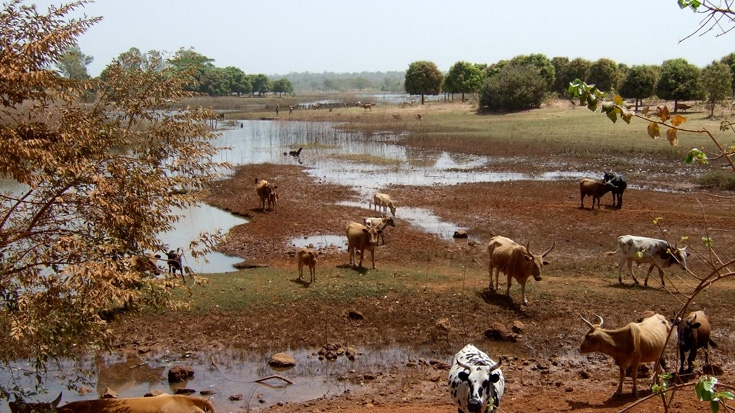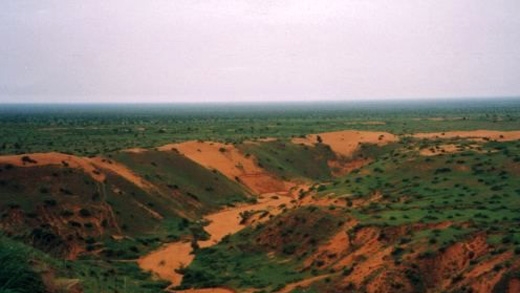Niger River Basin Management Project to support institutional strengthening of the Niger Basin Authority and enhance benefit sharing around the planned Fomi Dam
Posted in : Blog on 10 August 2014

STORY HIGHLIGHTS
- CIWA deepens its engagement in West Africa and the Sahel region through a new partnership with the Niger Basin Authority (NBA) on the Niger River Basin Management Project
- The $7.5 million project to target strengthening the institutional framework and financial sustainability of the NBA as well as enhancing regional cooperation around improving environmental and social aspects of the planned Fomi Dam
- Regional cooperation around planned infrastructure in the Niger Basin is critical for distributing impacts and benefits in a way that improves livelihoods in line with varying needs across the basin and for promoting overall sustainable economic growth
Following endorsement of the project’s justification note by its development partners, CIWA is set to begin an exciting new partnership with the Niger Basin Authority (NBA) on the Niger River Basin Management Project. The $7.5 million project aims to enhance the NBA’s capacity for facilitating improved water resources management and development in the Niger Basin. The project will achieve this by facilitating various mechanisms that promote the NBA’s financial sustainability as well as by supporting the operationalization of the basin’s Water Charter. Also, responding to the basin’s acute needs for infrastructure development, access to energy, storage of water, and other measures that contribute to climate resilience, the project will facilitate regional cooperation for enhanced benefit sharing and reduced social and environmental impacts around the planned Fomi dam. The Bank project team is currently collaborating with the NBA to develop key details of the project.
” Cooperative development of Fomi is particularly important given that the design and operating rules of the dam have the potential to influence the magnitude and share of both benefits and impacts for different riparians downstream of the dam “
Major General Collins Ihekire
Executive Secretary of the Niger Basin Authority

The Niger Basin covers nine countries – Benin, Burkina Faso, Cameroon, Chad, Ivory Coast, Guinea, Mali, Niger, and Nigeria – seven of which are among the twenty poorest countries in the world. The population in the basin is highly vulnerable, with seventy percent of the basin’s 130 million inhabitants living in rural areas amidst food insecurity due to extreme climate and rainfall variability. Along its 4,200km course, the Niger River is the basin’s economic mainstay. For thousands of years, the river has supported its riparian population with diverse livelihoods such as farming, cattle grazing, and fishing; it forms a particularly important lifeline in the arid and semi-arid lands of the Sahel. But while the basin faces acute challenges such as rural poverty and food insecurity, both exacerbated by climate change, it has tremendous potential for development of infrastructure including hydropower plants, irrigation schemes, and navigation facilities, all of which can significantly contribute towards economic growth and improvement of livelihoods especially if accompanied by sound integrated water resources management.
The NBA has a critical mandate to facilitate the coordinated and cooperative management of the Niger Basin. In line with the shared vision of member states, the NBA has developed a Sustainable Action Plan (SDAP) – an $8 billion, 20-year investment plan – consisting of a mix of large and small scale investments in the basin. The Fomi Dam is, in many ways, key to the SDAP. Located in the upper part of the basin in Guinea near the border with Mali, Fomi is a multipurpose, transformational project owing to its high potential upstream storage volume, significant transboundary benefits in the form of 210,000ha irrigated agriculture, and 90MW hydropower to be connected to the West Africa Power Pool Grid. A 2013 Climate Risk Assessment of the Niger Basin conducted by the World Bank demonstrates the important role that Fomi’s water storage can play in ensuring minimum required low-flows in the inland delta under a wide range of climate and infrastructure development scenarios.
“Cooperative development of Fomi is particularly important given that the design and operating rules of the dam have the potential to influence the magnitude and share of both benefits and impacts for different riparians downstream of the dam,” states Major General Collins Ihekire, Executive Secretary of the NBA. For instance, the design of the dam will impact the number of people, upto 45,000, to be resettled in Guinea, and also on livelihood impacts in Mali, particularly for cattle herders. Similarly, operating rules governing the seasonal release of water will need to balance productive needs such as energy and irrigation with environmental and social impacts associated with reduced seasonal flooding of the Inner Niger Delta, a Ramsar wetland area in Mali which is a significant source of livelihood for a local population of around 1 million. To fully realize the transformative potential of Fomi, it will be crucial to enhance the livelihoods of local communities through innovative mechanisms that enable transfer of benefits across borders.
This need is precisely the niche where CIWA’s comparative advantage fits. The project’s focus on crucial environmental and social issues will improve the quality of this much needed infrastructure, with likely activities to include detailed impact analysis of environmentally sensitive regions around the basin, an enhanced emphasis on ecosystem services in the inland delta, and strengthening of civil-society’s role in planning processes. CIWA will add value by enabling the NBA to carry out state of the art facilitation processes with a wide range of stakeholders on key aspects of project design. In order to bring forward important climate risk and vulnerability dimensions of the project, CIWA is also planning to support in-depth, iterative, and targeted follow up analysis, and development of actual mechanisms for benefit sharing to ensure these best reach vulnerable populations.
CIWA’s support comes at a critical time – when there is a financing gap for NBA support and recognition by the NBA of the limits of the traditional partner supported model. CIWA support will help the NBA to anchor institutional strengthening and capacity building activities and financial sustainability steps it must take in the process around an important hydraulic structure in the basin. The development of a structured, coordinated decision-making process around Fomi Dam – that considers options for benefit sharing in an inclusive regional context – would be a significant achievement that would greatly benefit the population in the basin. Indeed, this is at the heart of what CIWA strives to support.


